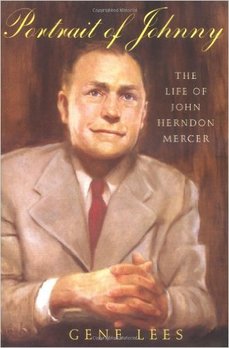|
Portrait of Johnny: The Life of John Herndon Mercer
by Gene Lees Johnny Mercer was inarguably one of the most important contributors to what we call the Great American Songbook in the history of American music—not so much as a composer, although he did write a couple pieces of music, but as a lyricist. Consider the songs for which he wrote lyrics, among them “I Thought About You,” “Too Marvelous for Words,” “Jeepers Creepers,” “Moon River,” “Laura,” “Skylark,” ”That Old Black Magic,” “One for My Baby,” “Satin Doll,” “Days of Wine and Roses,” “Day In, Day Out,” “I Remember You,” and that barely scratches the surface. Consider too the composers with whom Mercer teamed to create all this remarkable music: Hoagy Carmichael, Gordon Jenkins, Richard Whiting, Harry Warren, Jimmy Van Heusen, Harold Arlen, Jerome Kern, Henry Mancini. And again, we’re only scratching the surface here. And, by the way, in 1975, Paul McCartney approached Johnny Mercer proposing they collaborate on some tunes. Sadly, Mercer was ill at the time and, in fact, died in 1976 before anything could come of it. Pity. That would have been interesting at the least. Mercer was the most famous songwriter of his generation, considered by many—among them Oscar Hammerstein II and Alan Jay Lerner—the greatest lyricist in the English language. He was also a singer and recording artist. He was the host of a music show on the radio. And he was co-founder of Capitol Records. Writing in a confident, conversational style, replete with informed insight into the music, the music historian and biographer Gene Lees, author of Portrait of Johnny and one of Mercer’s best friends, offers us here an intimate, highly personal, warts-and-all examination of a very complicated man. What emerges is a portrait of an immensely talented, successful artist and businessman with a happy-go-lucky persona who, at the same time was desperately unhappy, trapped in a loveless marriage, a man who sought solace in alcohol, a notoriously mean drunk. Lees takes us back to the beginning, back to Mercer’s childhood days in his hometown of Savannah, Georgia, where he was exposed to the local African-American culture that clearly influenced his later songwriting. We learn of Mercer’s early struggles to establish himself as a songwriter in New York, followed by his Hollywood years, years that combined great success with increasing unhappiness and more drinking. Lees assigns much of the blame for this unhappiness on Mercer’s marriage to Ginger Meehan, a once-attractive chorus girl whom Mercer had married in 1931. The state of Mercer’s marriage, it must be said, however, was hardly enhanced by his stormy, long-running affair with Judy Garland. Johnny Mercer’s career began to decline at the same time America’s taste in music began to change—or what Lees describes as the death of the “golden age of American songwriting” and the “rising tide of the meretricious.” This is not an objective record of a man’s life, nor did Gene Lees ever expect it could be or so intend it. He was just too close to his subject for anything like that, and we the readers are the beneficiaries of that closeness. As for Lees’s rather jaundiced view of Mercer’s wife, Ginger, it’s not for us to evaluate. That she perhaps underappreciated the talents of the man who was her husband for so long, however, could be argued. Sometime after Mercer’s death in 1976, Ginger came across a trove of unpublished lyrics her husband had written earlier. Thinking these lyrics should be set to music, she brought them to a composer: Barry Manilow. (Manilow did indeed write music to those previously unpublished Johnny Mercer lyrics, and they were recorded by Nancy Wilson, among others. One of the tunes particularly, “When October Goes,” stands up quite well and is, in fact, not a surprising entry on the playlists of many of today’s jazz musicians. —Terry MacDonald Hardcover: 384 pages Publisher: Pantheon; First Edition edition (October 26, 2004) Language: English ISBN-10: 0375420606 ISBN-13:978-0375420603 |
Copyright ©2024 Seacoast Jazz Society, All Rights Reserved



